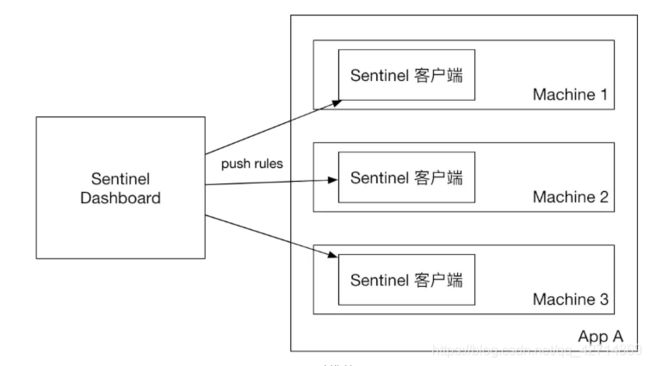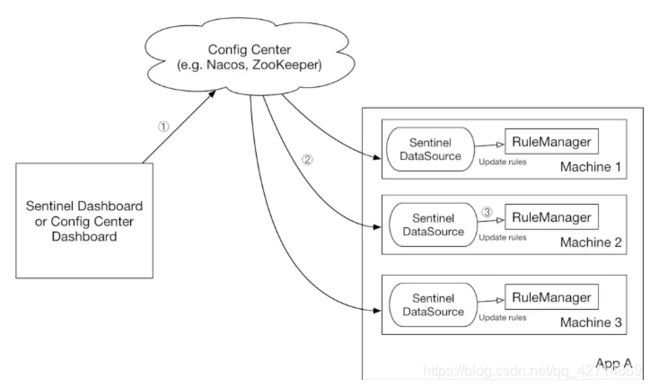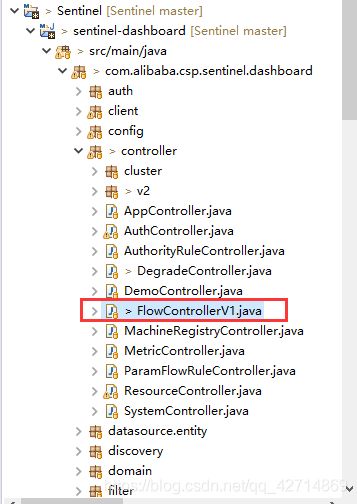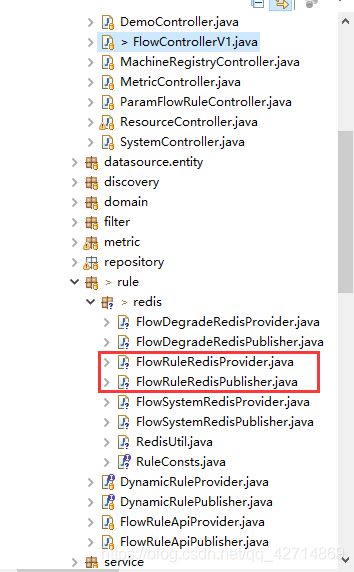阿里sentinel监控使用redis持久化规则
规则配置
一、从 Sentinel 1.4.0 开始,sentinel抽取出了接口用于向远程配置中心推送规则以及拉取规则:
DynamicRuleProvider: 拉取规则DynamicRulePublisher: 推送规则
用户只需实现 DynamicRuleProvider 和 DynamicRulePublisher 接口,即可实现应用维度推送
改造前原理分析:
客户端利用sentinel-transport-simple-http模块暴露一个特定的端口,sentinel-dashboard项目通过http的形式进行数据推送,客户端接收后将规则保存在本地内存中,如下图
改造后原理解析:
sentinel-dashboard项目控制台将配置信息推送到配置中心,如nacos、zookeeper、apollo中,由配置中心去进行配置推送,更新配置到客户端本地内存中,如下图
二、官方提供了 Nacos、Apollo 、zookeeper的推送和拉取规则实现示例(位于 test 目录下)
三、官方没有给出redis持久化规则demo,下面我们自己改造
注意:由于redis没有控制台,所以当客户端挂掉重启后,内存中的限流、降级等配置信息丢失,sentinel-dashboard项目需要通过按钮,定时任务等重新推送配置信息给客户端,或者客户端自己拉取规则。
1、sentinel-dashboard项目引入redis依赖
org.springframework.boot
spring-boot-starter-data-redis
2.0.5.RELEASE
2、改造controller
核心代码:
@Autowired
@Qualifier("flowRuleRedisProvider")
private DynamicRuleProvider
@Autowired
@Qualifier("flowRuleRedisPublisher")
private DynamicRulePublisher
完整代码如下:
package com.alibaba.csp.sentinel.dashboard.controller;
import java.util.Date;
import java.util.List;
import javax.servlet.http.HttpServletRequest;
import org.slf4j.Logger;
import org.slf4j.LoggerFactory;
import org.springframework.beans.factory.annotation.Autowired;
import org.springframework.beans.factory.annotation.Qualifier;
import org.springframework.web.bind.annotation.DeleteMapping;
import org.springframework.web.bind.annotation.GetMapping;
import org.springframework.web.bind.annotation.PostMapping;
import org.springframework.web.bind.annotation.PutMapping;
import org.springframework.web.bind.annotation.RequestBody;
import org.springframework.web.bind.annotation.RequestMapping;
import org.springframework.web.bind.annotation.RequestParam;
import org.springframework.web.bind.annotation.RestController;
import com.alibaba.csp.sentinel.dashboard.auth.AuthService;
import com.alibaba.csp.sentinel.dashboard.auth.AuthService.AuthUser;
import com.alibaba.csp.sentinel.dashboard.auth.AuthService.PrivilegeType;
import com.alibaba.csp.sentinel.dashboard.client.SentinelApiClient;
import com.alibaba.csp.sentinel.dashboard.datasource.entity.rule.FlowRuleEntity;
import com.alibaba.csp.sentinel.dashboard.discovery.MachineInfo;
import com.alibaba.csp.sentinel.dashboard.domain.Result;
import com.alibaba.csp.sentinel.dashboard.repository.rule.InMemoryRuleRepositoryAdapter;
import com.alibaba.csp.sentinel.dashboard.rule.DynamicRuleProvider;
import com.alibaba.csp.sentinel.dashboard.rule.DynamicRulePublisher;
import com.alibaba.csp.sentinel.util.StringUtil;
import com.alibaba.fastjson.JSON;
/**
* Flow rule controller (v1).
*
* @author Eric Zhao
* @since 1.4.0
*/
@RestController
@RequestMapping(value = "/v1/flow")
public class FlowControllerV1 {
private final Logger logger = LoggerFactory.getLogger(FlowControllerV1.class);
@Autowired
private InMemoryRuleRepositoryAdapter repository;
@Autowired
@Qualifier("flowRuleRedisProvider")
private DynamicRuleProvider> ruleProvider;
@Autowired
@Qualifier("flowRuleRedisPublisher")
private DynamicRulePublisher> rulePublisher;
@Autowired
private AuthService authService;
@Autowired
private SentinelApiClient sentinelApiClient;
@GetMapping("/rules")
public Result> apiQueryMachineRules(HttpServletRequest request, @RequestParam String app) {
AuthUser authUser = authService.getAuthUser(request);
authUser.authTarget(app, PrivilegeType.READ_RULE);
if (StringUtil.isEmpty(app)) {
return Result.ofFail(-1, "app can't be null or empty");
}
try {
List rules = ruleProvider.getRules(app);
if (rules != null && !rules.isEmpty()) {
for (FlowRuleEntity entity : rules) {
entity.setApp(app);
if (entity.getClusterConfig() != null && entity.getClusterConfig().getFlowId() != null) {
entity.setId(entity.getClusterConfig().getFlowId());
}
}
}
rules = repository.saveAll(rules);
return Result.ofSuccess(rules);
} catch (Throwable throwable) {
logger.error("Error when querying flow rules", throwable);
return Result.ofThrowable(-1, throwable);
}
}
private Result checkEntityInternal(FlowRuleEntity entity) {
if (entity == null) {
return Result.ofFail(-1, "invalid body");
}
if (StringUtil.isBlank(entity.getApp())) {
return Result.ofFail(-1, "app can't be null or empty");
}
if (StringUtil.isBlank(entity.getLimitApp())) {
return Result.ofFail(-1, "limitApp can't be null or empty");
}
if (StringUtil.isBlank(entity.getResource())) {
return Result.ofFail(-1, "resource can't be null or empty");
}
if (entity.getGrade() == null) {
return Result.ofFail(-1, "grade can't be null");
}
if (entity.getGrade() != 0 && entity.getGrade() != 1) {
return Result.ofFail(-1, "grade must be 0 or 1, but " + entity.getGrade() + " got");
}
if (entity.getCount() == null || entity.getCount() < 0) {
return Result.ofFail(-1, "count should be at lease zero");
}
if (entity.getStrategy() == null) {
return Result.ofFail(-1, "strategy can't be null");
}
if (entity.getStrategy() != 0 && StringUtil.isBlank(entity.getRefResource())) {
return Result.ofFail(-1, "refResource can't be null or empty when strategy!=0");
}
if (entity.getControlBehavior() == null) {
return Result.ofFail(-1, "controlBehavior can't be null");
}
int controlBehavior = entity.getControlBehavior();
if (controlBehavior == 1 && entity.getWarmUpPeriodSec() == null) {
return Result.ofFail(-1, "warmUpPeriodSec can't be null when controlBehavior==1");
}
if (controlBehavior == 2 && entity.getMaxQueueingTimeMs() == null) {
return Result.ofFail(-1, "maxQueueingTimeMs can't be null when controlBehavior==2");
}
if (entity.isClusterMode() && entity.getClusterConfig() == null) {
return Result.ofFail(-1, "cluster config should be valid");
}
return null;
}
@PostMapping("/rule")
public Result apiAddFlowRule(HttpServletRequest request, @RequestBody FlowRuleEntity entity) {
AuthUser authUser = authService.getAuthUser(request);
authUser.authTarget(entity.getApp(), PrivilegeType.WRITE_RULE);
Result checkResult = checkEntityInternal(entity);
if (checkResult != null) {
return checkResult;
}
entity.setId(null);
Date date = new Date();
entity.setGmtCreate(date);
entity.setGmtModified(date);
entity.setLimitApp(entity.getLimitApp().trim());
entity.setResource(entity.getResource().trim());
try {
entity = repository.save(entity);
} catch (Throwable throwable) {
logger.error("Failed to add flow rule", throwable);
return Result.ofThrowable(-1, throwable);
}
if (!publishRules(entity.getApp(), entity.getIp(), entity.getPort())) {
logger.error("Publish flow rules failed after rule add");
}
return Result.ofSuccess(entity);
}
@PutMapping("/save.json")
public Result updateIfNotNull(HttpServletRequest request, Long id, String app,
String limitApp, String resource, Integer grade,
Double count, Integer strategy, String refResource,
Integer controlBehavior, Integer warmUpPeriodSec,
Integer maxQueueingTimeMs) {
AuthUser authUser = authService.getAuthUser(request);
authUser.authTarget(app, PrivilegeType.WRITE_RULE);
if (id == null) {
return Result.ofFail(-1, "id can't be null");
}
FlowRuleEntity entity = repository.findById(id);
if (entity == null) {
return Result.ofFail(-1, "id " + id + " dose not exist");
}
if (StringUtil.isNotBlank(app)) {
entity.setApp(app.trim());
}
if (StringUtil.isNotBlank(limitApp)) {
entity.setLimitApp(limitApp.trim());
}
if (StringUtil.isNotBlank(resource)) {
entity.setResource(resource.trim());
}
if (grade != null) {
if (grade != 0 && grade != 1) {
return Result.ofFail(-1, "grade must be 0 or 1, but " + grade + " got");
}
entity.setGrade(grade);
}
if (count != null) {
entity.setCount(count);
}
if (strategy != null) {
if (strategy != 0 && strategy != 1 && strategy != 2) {
return Result.ofFail(-1, "strategy must be in [0, 1, 2], but " + strategy + " got");
}
entity.setStrategy(strategy);
if (strategy != 0) {
if (StringUtil.isBlank(refResource)) {
return Result.ofFail(-1, "refResource can't be null or empty when strategy!=0");
}
entity.setRefResource(refResource.trim());
}
}
if (controlBehavior != null) {
if (controlBehavior != 0 && controlBehavior != 1 && controlBehavior != 2) {
return Result.ofFail(-1, "controlBehavior must be in [0, 1, 2], but " + controlBehavior + " got");
}
if (controlBehavior == 1 && warmUpPeriodSec == null) {
return Result.ofFail(-1, "warmUpPeriodSec can't be null when controlBehavior==1");
}
if (controlBehavior == 2 && maxQueueingTimeMs == null) {
return Result.ofFail(-1, "maxQueueingTimeMs can't be null when controlBehavior==2");
}
entity.setControlBehavior(controlBehavior);
if (warmUpPeriodSec != null) {
entity.setWarmUpPeriodSec(warmUpPeriodSec);
}
if (maxQueueingTimeMs != null) {
entity.setMaxQueueingTimeMs(maxQueueingTimeMs);
}
}
Date date = new Date();
entity.setGmtModified(date);
try {
entity = repository.save(entity);
if (entity == null) {
return Result.ofFail(-1, "save entity fail");
}
} catch (Throwable throwable) {
logger.error("save error:", throwable);
return Result.ofThrowable(-1, throwable);
}
if (!publishRules(entity.getApp(), entity.getIp(), entity.getPort())) {
logger.info("publish flow rules fail after rule update");
}
return Result.ofSuccess(entity);
}
@DeleteMapping("/delete.json")
public Result delete(HttpServletRequest request, Long id) {
AuthUser authUser = authService.getAuthUser(request);
if (id == null) {
return Result.ofFail(-1, "id can't be null");
}
FlowRuleEntity oldEntity = repository.findById(id);
if (oldEntity == null) {
return Result.ofSuccess(null);
}
authUser.authTarget(oldEntity.getApp(), PrivilegeType.DELETE_RULE);
try {
repository.delete(id);
} catch (Exception e) {
return Result.ofFail(-1, e.getMessage());
}
if (!publishRules(oldEntity.getApp(), oldEntity.getIp(), oldEntity.getPort())) {
logger.info("publish flow rules fail after rule delete");
}
return Result.ofSuccess(id);
}
private boolean publishRules(String app, String ip, Integer port) {
List rules = repository.findAllByMachine(MachineInfo.of(app, ip, port));
try {
rulePublisher.publish(app, rules);
logger.info("添加限流规则成功{}",JSON.toJSONString(rules));
} catch (Exception e) {
e.printStackTrace();
logger.warn("publishRules failed", e);
return false;
}
//核心代码,sentinel-dashboard通过http的形式进行数据推送,客户端接收后将规则保存在本地内存中
return sentinelApiClient.setFlowRuleOfMachine(app, ip, port, rules);
}
}
3、改造接口实现
完整代码如下:
FlowRuleRedisProvider代码
package com.alibaba.csp.sentinel.dashboard.rule.redis;
import java.util.ArrayList;
import java.util.List;
import org.springframework.beans.factory.annotation.Autowired;
import org.springframework.stereotype.Component;
import com.alibaba.csp.sentinel.dashboard.datasource.entity.rule.FlowRuleEntity;
import com.alibaba.csp.sentinel.dashboard.rule.DynamicRuleProvider;
import com.alibaba.csp.sentinel.util.StringUtil;
import com.alibaba.fastjson.JSONObject;
@Component("flowRuleRedisProvider")
public class FlowRuleRedisProvider implements DynamicRuleProvider> {
@Autowired
private RedisUtil redisConfigUtil;
@Override
public List getRules(String appName) throws Exception {
String rules = redisConfigUtil.getString(RuleConsts.RULE_FLOW + appName);
if (StringUtil.isEmpty(rules)) {
return new ArrayList<>();
}
return JSONObject.parseArray(rules,FlowRuleEntity.class);
}
} FlowRuleRedisPublisher代码
package com.alibaba.csp.sentinel.dashboard.rule.redis;
import java.util.List;
import org.springframework.beans.factory.annotation.Autowired;
import org.springframework.stereotype.Component;
import com.alibaba.csp.sentinel.dashboard.datasource.entity.rule.FlowRuleEntity;
import com.alibaba.csp.sentinel.dashboard.rule.DynamicRulePublisher;
import com.alibaba.csp.sentinel.util.AssertUtil;
import com.alibaba.fastjson.JSON;
@Component("flowRuleRedisPublisher")
public class FlowRuleRedisPublisher implements DynamicRulePublisher> {
@Autowired
private RedisUtil redisConfigUtil;
@Override
public void publish(String app, List rules) throws Exception {
AssertUtil.notEmpty(app, "app name cannot be empty");
if (rules == null) {
return;
}
String strs = JSON.toJSONString(rules);
redisConfigUtil.setString(RuleConsts.RULE_FLOW + app, strs);
}
} RedisUtil代码
package com.alibaba.csp.sentinel.dashboard.rule.redis;
import java.util.concurrent.TimeUnit;
import org.springframework.beans.factory.annotation.Autowired;
import org.springframework.data.redis.core.StringRedisTemplate;
import org.springframework.stereotype.Component;
@Component
public class RedisUtil {
@Autowired
private StringRedisTemplate stringRedisTemplate;
public StringRedisTemplate getStringRedisTemplate() {
return stringRedisTemplate;
}
/**
* 存放string类型
* @param key
* @param data
* @param timeout
*/
public void setString(String key, String data, Long timeout) {
try {
stringRedisTemplate.opsForValue().set(key, data);
if (timeout != null) {
stringRedisTemplate.expire(key, timeout, TimeUnit.SECONDS);
}
} catch (Exception e) {
}
}
/**
* 存放string类型
* @param key
* @param data
*/
public void setString(String key, String data) {
setString(key, data, null);
}
/**
* 根据key查询string类型
* @param key
* @return
*/
public String getString(String key) {
String value = stringRedisTemplate.opsForValue().get(key);
return value;
}
/**
* 根据对应的key删除key
* @param key
*/
public Boolean delKey(String key) {
return stringRedisTemplate.delete(key);
}
}
RuleConsts代码
package com.alibaba.csp.sentinel.dashboard.rule.redis;
public interface RuleConsts {
//流控规则key前缀
public final String RULE_FLOW = "sentinel_rule_flow_";
//限流规则key前缀
public final String RULE_DEGRADE = "sentinel_rule_degrade_";
//系统规则key前缀
public final String RULE_SYSTEM = "sentinel_rule_system_";
}
4、以上步骤完成后,只是sentinel-dashboard监控服务端改造完成,下面改造sentinel-client被监控的客户端;由于客户端重启项目之后内存中的限流、降级等规则丢失,所以项目启动的时候需要重新加载配置规则到内存中,增加配置类,代码如下:
package com.it.sentinel.demo.config;
import java.util.List;
import org.springframework.beans.factory.annotation.Value;
import org.springframework.boot.ApplicationArguments;
import org.springframework.boot.ApplicationRunner;
import org.springframework.stereotype.Component;
import com.alibaba.csp.sentinel.config.SentinelConfig;
import com.alibaba.csp.sentinel.datasource.Converter;
import com.alibaba.csp.sentinel.datasource.ReadableDataSource;
import com.alibaba.csp.sentinel.datasource.redis.RedisDataSource;
import com.alibaba.csp.sentinel.datasource.redis.config.RedisConnectionConfig;
import com.alibaba.csp.sentinel.slots.block.degrade.DegradeRule;
import com.alibaba.csp.sentinel.slots.block.degrade.DegradeRuleManager;
import com.alibaba.csp.sentinel.slots.block.flow.FlowRule;
import com.alibaba.csp.sentinel.slots.block.flow.FlowRuleManager;
import com.alibaba.csp.sentinel.slots.system.SystemRule;
import com.alibaba.csp.sentinel.slots.system.SystemRuleManager;
import com.alibaba.fastjson.JSON;
import com.alibaba.fastjson.TypeReference;
import lombok.extern.slf4j.Slf4j;
@Component
@Slf4j
public class RedisDataSourceConfig implements ApplicationRunner{
@Value("${spring.redis.host}")
public String redisHost;
@Value("${spring.redis.port}")
public int redisPort;
//限流规则key前缀
public final String RULE_FLOW = "sentinel_rule_flow_";
public final String RULE_FLOW_CHANNEL = "sentinel_rule_flow_channel";
//降级规则key前缀
public final String RULE_DEGRADE = "sentinel_rule_degrade_";
public final String RULE_DEGRADE_CHANNEL = "sentinel_rule_degrade_channel";
//系统规则key前缀
public final String RULE_SYSTEM = "sentinel_rule_system_";
public final String RULE_SYSTEM_CHANNEL = "sentinel_rule_system_channel";
/**
* ApplicationRunner
* 该接口的方法会在服务启动之后被立即执行
* 主要用来做一些初始化的工作
* 但是该方法的运行是在SpringApplication.run(…) 执行完毕之前执行
*/
@Override
public void run(ApplicationArguments args) throws Exception {
log.info(">>>>>>>>>执行sentinel规则初始化");
RedisConnectionConfig config = RedisConnectionConfig.builder().withHost(redisHost).withPort(redisPort).build();
Converter> parser = source -> JSON.parseObject(source,new TypeReference>() {});
ReadableDataSource> redisDataSource = new RedisDataSource<>(config, RULE_FLOW+SentinelConfig.getAppName(), RULE_FLOW_CHANNEL, parser);
FlowRuleManager.register2Property(redisDataSource.getProperty());
Converter> parser1 = source -> JSON.parseObject(source,new TypeReference>() {});
ReadableDataSource> redisDataSource1 = new RedisDataSource<>(config, RULE_DEGRADE+SentinelConfig.getAppName(), RULE_DEGRADE_CHANNEL, parser1);
DegradeRuleManager.register2Property(redisDataSource1.getProperty());
Converter> parser2 = source -> JSON.parseObject(source,new TypeReference>() {});
ReadableDataSource> redisDataSource2 = new RedisDataSource<>(config, RULE_SYSTEM+SentinelConfig.getAppName(), RULE_SYSTEM_CHANNEL, parser2);
SystemRuleManager.register2Property(redisDataSource2.getProperty());
}
}
5、使用redis持久化sentinel配置规则,改造完成。



